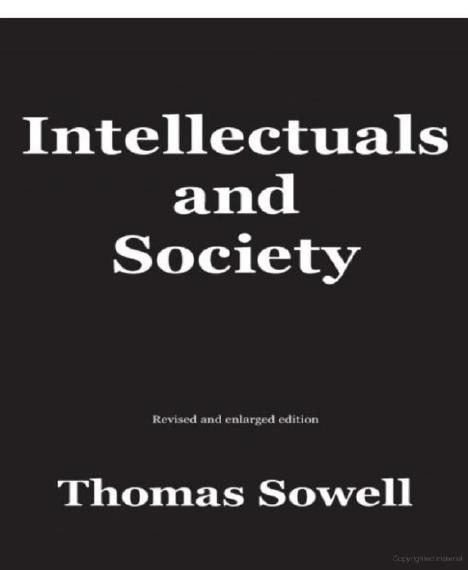Intellectuals and Society by Thomas Sowell

Author:Thomas Sowell [Sowell, Thomas]
Language: eng
Format: epub, mobi, pdf
Tags: Politics
Publisher: Basic Books
Published: 2012-12-16T05:02:00+00:00
Property Rights
Nowhere have the actual results of “results”-oriented judicial rulings been more radically different from what was contemplated than in the case of property rights, which have long been a battleground between those with opposing social visions. As ideas of a “living Constitution,” to be applied to current conditions as judges see fit, became dominant in the second half of the twentieth century, property rights have been reduced to second-class status, at best. As distinguished urban economist Edwin S. Mills put it, “the courts have virtually abolished the Fifth Amendment as it applies to urban real estate.”103
Property rights are seen in radically different terms by those with the tragic vision and those with the vision of the anointed. Those with the tragic vision of human flaws and failings see property rights as necessary limitations on the power of government officials to seize the belongings of the populace, whether for their own use or for dispersal as largesse to various constituencies whose political or financial support the politicians seek. Such actions by power holders were common in ancient despotisms and not unknown in modern democracies. Those who founded the United States of America and wrote the Constitution saw property rights as essential for safeguarding all other rights. The right to free speech, for example, would be meaningless if criticisms of the authorities could lead to whatever you owned being seized in retaliation.
Economists have seen property rights as essential to (1) keeping economic decision-making in the hands of private individuals—that is, out of the hands of politicians, and (2) maintaining incentives for private individuals to invest time, talents and resources, in the expectation of being able to reap and retain the rewards of their efforts. However, those with the vision of the anointed, in which surrogate decision-makers are better equipped than others to make wise decisions, see property rights as obstacles to the achievement of various desirable social goals through government action. Property rights simply protect those individuals fortunate enough to own substantial property from the greater interests of society at large, according to those with this vision. Professor Laurence Tribe of the Harvard Law School, for example, said that property rights represent simply an individual benefit to “entrenched wealth.”104
In other words, property rights are seen in terms of their individual results, rather than in terms of the social processes facilitated by a property rights system of economic decision-making. By contrast, free speech rights are almost never seen in such narrow terms, as special interest benefits for that very small proportion of the population who are professional writers, media journalists or political activists. Instead, free speech rights are seen as rights essential to the functioning of the whole system of representative government, though property rights are seldom seen by intellectuals as similarly essential to the functioning of a market economy. Instead, property rights are readily disdained as special protections of the economically privileged, as they are by Professor Tribe and as they were before him by Roscoe Pound, Louis Brandeis, and many others.
Download
Intellectuals and Society by Thomas Sowell.mobi
Intellectuals and Society by Thomas Sowell.epub
Intellectuals and Society by Thomas Sowell.pdf
This site does not store any files on its server. We only index and link to content provided by other sites. Please contact the content providers to delete copyright contents if any and email us, we'll remove relevant links or contents immediately.
The Secret History by Donna Tartt(19090)
The Social Justice Warrior Handbook by Lisa De Pasquale(12190)
Thirteen Reasons Why by Jay Asher(8912)
This Is How You Lose Her by Junot Diaz(6887)
Weapons of Math Destruction by Cathy O'Neil(6281)
Zero to One by Peter Thiel(5802)
Beartown by Fredrik Backman(5755)
The Myth of the Strong Leader by Archie Brown(5508)
The Fire Next Time by James Baldwin(5446)
How Democracies Die by Steven Levitsky & Daniel Ziblatt(5219)
Promise Me, Dad by Joe Biden(5154)
Stone's Rules by Roger Stone(5088)
A Higher Loyalty: Truth, Lies, and Leadership by James Comey(4964)
100 Deadly Skills by Clint Emerson(4926)
Rise and Kill First by Ronen Bergman(4789)
Secrecy World by Jake Bernstein(4753)
The David Icke Guide to the Global Conspiracy (and how to end it) by David Icke(4720)
The Farm by Tom Rob Smith(4514)
The Doomsday Machine by Daniel Ellsberg(4490)
